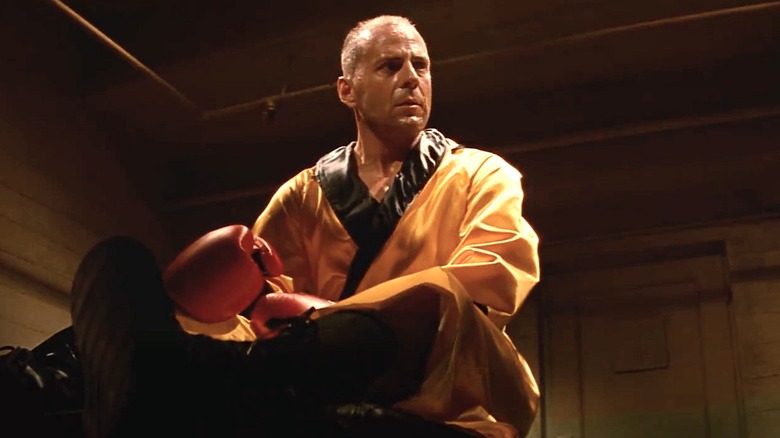Pulp Fiction's Boxer Story Actually Came From Roger Avary
Decades after its release, "Pulp Fiction" is widely regarded not just as one of the best flicks of the 1990s, or an all-timer among the indie film set, but one of the greatest movies ever made. And if you've seen the second film written and directed by Quentin Tarantino, you know its reputation is more than well-earned, with "Pulp Fiction" proving as wildly inventive in its scripting as it is boldly innovative in its disjointed narrative approach.
The success of "Pulp Fiction" inspired a generation of would-be filmmakers (and countless knockoffs) upon its release, and the film remains a generation-defining piece of work. Of course, the film's writing, casting, and shooting have all been heavily mythologized over the years, with people too often forgetting Tarantino had more than a little help from his longtime friend and former collaborator Roger Avary in bringing the various stories to life on the page.
While Avary's official credit on "Pulp Fiction" is "Stories By," his contributions to the screenplay have been regularly questioned over the years. That very topic was covered in vivid detail in Vanity Fair's 2013 "Making Of" article about the film. And in the course of discussing the film's writing, it's revealed the story of down-and-out boxer Butch Coolidge (Bruce Willis) — arguably the narrative-unifying centerpiece of "Pulp Fiction" — was indeed Avary's contribution. So vital is that storyline to "Pulp Fiction," that when asked if he believed he'd earned a co-writer credit on the film, Avary responded simply, "I think so."
Pulp Fiction ultimately made an Oscar-winner of Roger Avary
As Roger Avary noted in the Vanity Fair piece, he and Quentin Tarantino approached the writing of "Pulp Fiction," by essentially trying to fit together every scene they'd ever written together. And as the story goes, they fittingly did so while hanging out in Amsterdam. Still, by the time the actual script for "Pulp Fiction" came together, it seems Butch's story was Avary's biggest contribution. What's unclear even in the VF piece is exactly how much of that story was penned directly by Avary, and how much sprung from Tarantino's tinkering.
Whatever the case, Tarantino made no bones about the authorship of "Pulp Fiction," pointedly telling Vanity Fair, "He [Avary] didn't write the script," despite it being reported he'd paid his collaborator $25,000 for rights to the story. In spite of Avary's beliefs he'd earned a co-writer credit, Tarantino reportedly demanded mid-production he take "Stories By" instead. And rumors abound about how Avary responded, despite eventually agreeing to Tarantino's terms. In lieu of that co-writer credit, Avary apparently settled for a take of the film's back-end profits — a savvy move given "Pulp Fiction" grossed more than $200 million at the worldwide box office.
More than that, "Pulp Fiction" would make both Avary and Tarantino Oscar-winners at the 1995 Academy Awards ceremony, with the film netting the statue for Best Original Screenplay. And just FYI — at the time of the article's publication, Avary clearly had no hard feelings about his credit on the film, telling the publication, "I love the movie. I'm delighted with my contribution. That is enough. And I love Quentin. He's like a brother."

